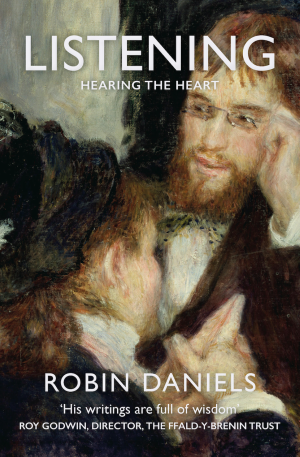Heart to Heart Listening
A reflection on the art of listening well. By Sandra Haynes
 A young man went to visit the great Jewish philosopher, Martin Buber. The conversation was cordial, attentive and open. A while later, he heard that his visitor had died at the front, in the First World War. Guilt and anguish were felt by Buber, who soon came to see that he had not sensed what he later called ‘the question not spoken’.
A young man went to visit the great Jewish philosopher, Martin Buber. The conversation was cordial, attentive and open. A while later, he heard that his visitor had died at the front, in the First World War. Guilt and anguish were felt by Buber, who soon came to see that he had not sensed what he later called ‘the question not spoken’.
Robin Daniels’ latest book, Listening: Hearing the Heart opens with the story outlined above. Buber had failed to notice the unspoken words, the tone of voice and the general demeanour of the young man. Real listening requires an emptying of oneself and one’s own ego and a willingness to give time and space to another.
How often have we enquired, ‘How are you?’ as we pass someone in a corridor, yet not really wanted to know or waited for an answer. With regard to the story, the failure to really listen was the difference between life and death.
Listening requires us to be still before God
‘Our hearts are restless, Lord, until they rest in thee.’ (St Augustine)
To listen to others we first need listen to God. Our spiritual welfare and growth needs this Divine Encounter. Spending time in silence allows us to make that heart-to-heart connection with our Maker. He knows us more than we know ourselves. When our heart is aligned with His, then we become a worthy conduit of His love and are able to support others.
Listening to God requires diligence on our part. To know Him is to love Him. When a couple meet for the first time, they spend each waking moment getting to know the other person. We are unable to know what God is asking of us if we do not know Him personally as our Father. If possible, spend some time in nature or on a retreat and use the opportunity to deepen your walk with Him.
Listening well
‘By honouring the other person, you may help him to honour himself.’
St Benedict challenges us to ‘listen with the ear of your heart’. We have two ears and only one mouth, therefore we are to listen twice as hard, and only open our mouth to speak when it is truly necessary! Listening to the truth, however unpleasant that might be, requires us to listen with our heart and not our head. When we listen with our heart, we allow the speaker the space they need to process their situation. Our challenge is to see Christ in the other person and give them due respect.
‘To everything there is a season … a time to keep silent, and a time to speak.’ (Ecclesiastes 3:1, 7)
Listening is a gift. Some people have the natural ability not only to listen, but also to listen well. They know when to remain silent and when to speak. In the silence they are not formulating their own thoughts and questions. Rather they are allowing the words of the speaker to take root in their being. Like a well-choreographed dance, they wait and choose the best moment to speak. Above all, they feed back what they have heard and with caution share what they perceive to be helpful. In short, the dialogue is genuine and sincere.
Deep listening involves the whole person, and so regular self-development is not only worthwhile but also necessary. To be well rounded we must guard our own physical, emotional and spiritual well-being. Making a regular, honest review of our life will enable us to highlight any imbalances and deal with them appropriately.
The benefits of being listened to
‘The core and essence of good listening is to support and accompany the speaker, while he reconnects with his own unique wisdom and self-belief.’
Most worries hate to see the light of day, and ruminating on the problem allows us to explore unknown avenues, no matter how whacky they might seem! In truth, we all have the ability to find the answer within ourselves. What we often lack is the time and space to look at our circumstances and a guide to assist us on the journey. Truly knowing that we have the answer deep within is liberating and empowering. When we break free from the ties that bind, we become the person God fully intends us to be.
Five gifts
‘Skills and techniques can be learned and can help to improve the quality and depth of our listening. But ultimately, being a good listener is like being a good artist. What you do stems from who you are and how you are.’
The five main gifts highlighted by Daniels in Listening: Hearing the Heart are: stillness, gentleness, self-knowledge, self-awareness and humility.
And the greatest of these gifts is humility. Humility is accepting myself for who I am and encouraging others to be comfortable in their ‘own skin’. Being humble means we are willing to learn new things, let go of old ideas and embrace the unknown. This is particularly important when accompanying others along a difficult path. If we are unable to change our situation, then with help we have to find the courage to accept things as they are and look for the light amidst the darkness.
In conclusion
‘Love mobilises hope. This is the secret of good listening.’
All quotes are from Robin Daniels, Listening: Hearing the Heart unless otherwise stated.
Listening: Hearing the Heart was published in October 2017 by Instant Apostle (ISBN 978-1-909728-74-5, RRP £8.99). It is available from Christian bookshops and other online sellers
Baptist Times, 24/11/2017